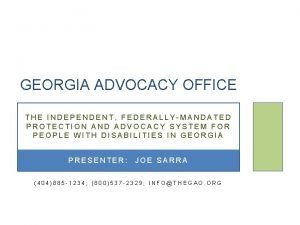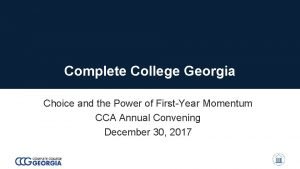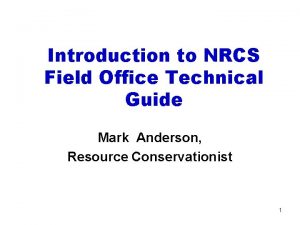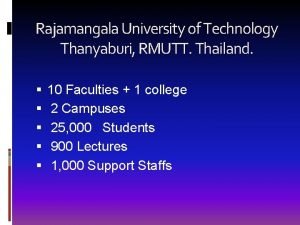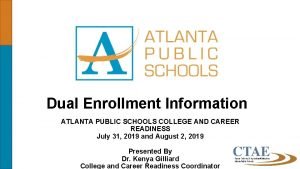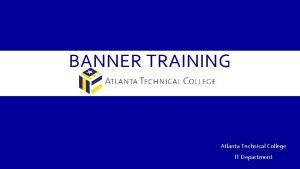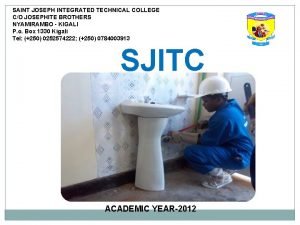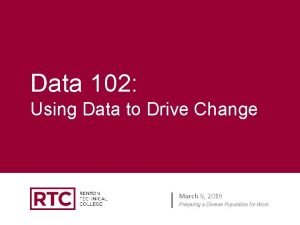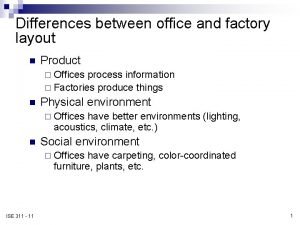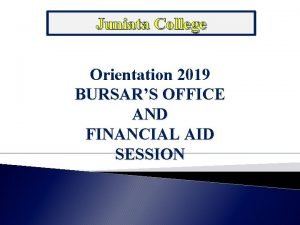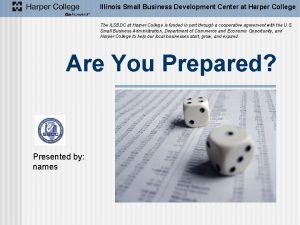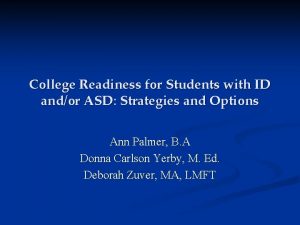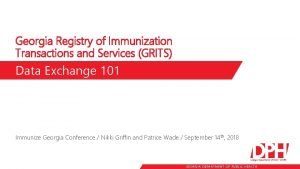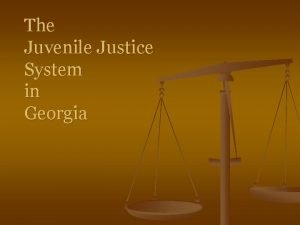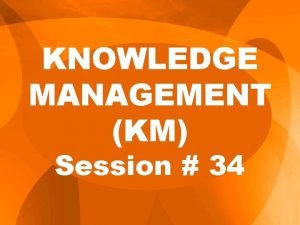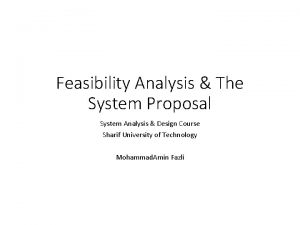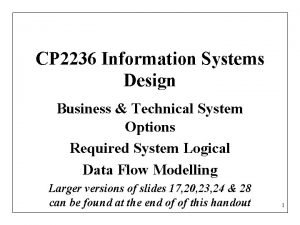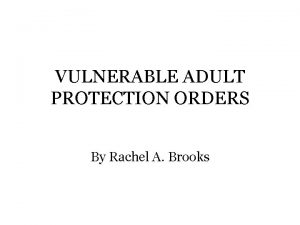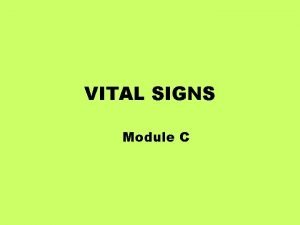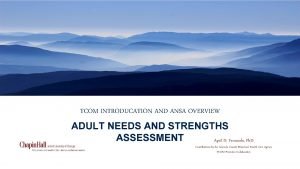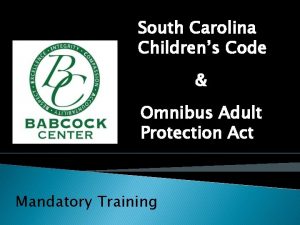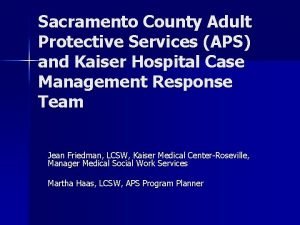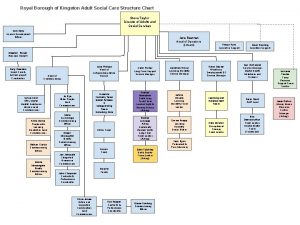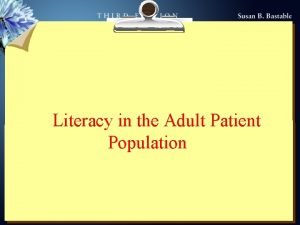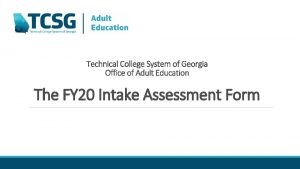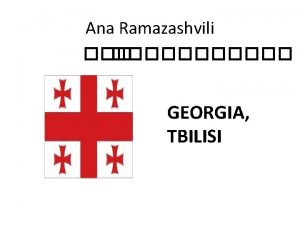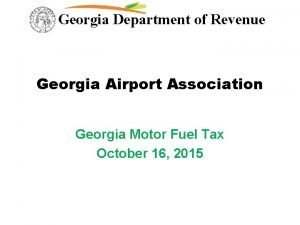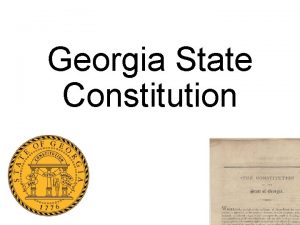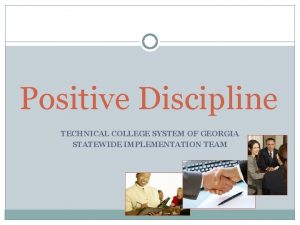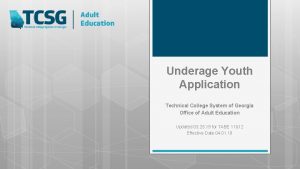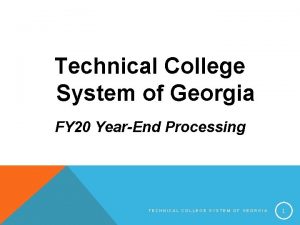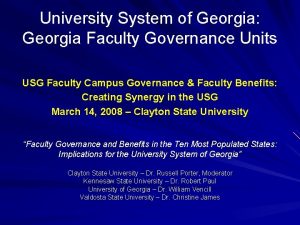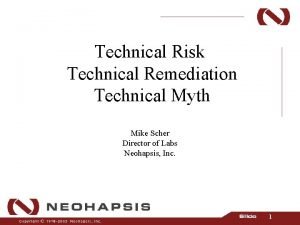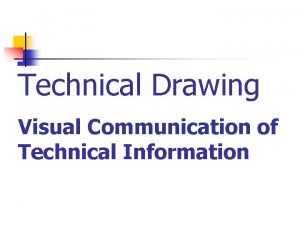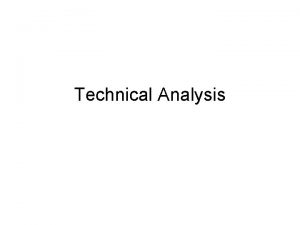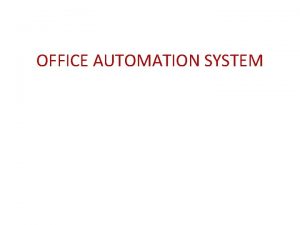Technical College System of Georgia Office of Adult




















































- Slides: 52

Technical College System of Georgia Office of Adult Education FY 19 Adult Learner Assessment Policies and Procedures Manual As required by the National Reporting System for Adult Education

2 Before Watching this Presentation w e i v e R FY 19 OAE Adult Learner Assessment Policies and Procedures Manual Participant Worksheet

3 Objectives Introduction and Overview General Assessment Requirements Guidelines for: BEST Literacy BEST Plus 2. 0 TABE 9&10 TABE 11&12 TABE CLAS-E

Introduction to the Assessment Policy Manual 4 AP, pages 3 -5

5 Why an Assessment Policy? Federal requirement: Division of Adult Education and Literacy (DAEL) National Reporting System for Adult Education (NRS) Technical Assistance Guide AP, pages 3 -4

6 Purposes and Uses of Assessments Student placement Develop rapport with student Analysis of diagnostic information Identify instructional strategies Establish student goals Monitor student progress Certify skill level and program completion AP, page 4

7 Use of Informal Assessments Guide Instruction Monitor Learning Types of Assessments § § § AP, page 4 Teacher-made tests Unit tests Portfolios Performance assessments Observations

Assessments – 8 English Language Learners AP, page 5

Assessments – 9 Adult Basic and Adult Secondary Education AP, page 5

10 Management Information System Georgia Adult Learners Information System (GALIS) https: //galis 3 trn. tcsg. edu/Galis/Default Store student records Record assessment scale scores Track student progress Generate reports Document special accommodations Document training

11 Assessment Records in GALIS must be an electronic copy of the student permanent record All assessment scores must be entered in GALIS, whether scores go up, go down, or stay the same All assessment data must be entered into GALIS within 10 business days GALIS will not accept assessment data if it has been 30 days or more since the administration date.

General Assessment Requirements 12 AP, page 6 -10

13 Students to be Assessed AP, page 6

14 Maintaining Assessment Records Assessment BEST Literacy BEST Plus 2. 0 TABE 9&10, 11&12 (print-based) TABE 9&10, 11&12 (computer-based or online) TABE CLAS-E AP, page 6 Documentation Test book and scoring sheet Score report Locator answer sheet*, test answer sheet and score report Score report Locator answer sheet, answer book, writing folio, score report *You can use TABE Locator 7&8 or 9&10 for TABE 9&10. TABE 11&12 placement must come from the TABE 11&12 Locator.

15 Pre-testing Students ALL students must be assessed within the first 12 hours of attendance The assessment must match the student’s goal for enrolling in the program The lowest test level determines placement of the student on federal NRS reports AP, page 7

16 Pre-testing and Periods of Participation (Po. Ps) Pre-test scores from students who stop-out of the program are valid within the 270 calendar day period If a student exits for at least 90 days and then begins a new POP, test scores are valid as long as they have not exceeded the validity period If scores are outside of 270 calendar days, a new assessment must be administered This rule applies to post-tests, as well AP, page 7

17 Post-testing Students All students who meet the minimum hours of instruction for each assessment must be post-tested These timeframes vary from assessment to assessment Test students within 20 hours of reaching the posttesting minimum hours AP, page 8

GALIS enforces the following post-testing timeframes: 18 Assessment Timeframe BEST Literacy After 60 hours of instruction BEST Plus 2. 0 After 60 hours of instruction TABE 9&10, 11&12 After 40 hours of instruction (ABE) After 30 hours of instruction (ASE) TABE CLAS-E After 60 hours of instruction AP, page 8

19 Training Requirements Local providers ensure test administrators receive proper training each fiscal year OAE provides training for: Assessment Policies and NRS General guidelines for assessments BEST Plus and BEST Literacy All training documented in GALIS AP, pages 9 -10

20 Training Guidelines BEST Literacy CAL recommends studying the test administration manual and 3 -4 practice administrations BEST Plus 2. 0 CAL requires a one-day training with a certified trainer and 20 practice administrations TABE and TABE DRC/CTB recommends that test administrators be CLAS-E trained before administering the test AP, page 9 -10

21 Pre-testing Accommodations Low literacy level Lack of English proficiency Attempts to assess must be documented in student records and GALIS AP, page 10

22 Baseline Scores BEST Literacy Enter form attempted/scale score of 0 BEST Plus 2. 0 Enter form attempted/scale score of 88 TABE 9&10: Level L, Reading Enter form attempted/scale score of 160 TABE 9&10: Level L, Math Enter form attempted/scale score of 180 TABE CLAS-E: Listening/Speaking Enter form attempted/scale score of 230 TABE CLAS-E: Reading/Writing Enter form attempted/scale score of 225 AP, page 6

23 Accommodations for Disabilities Accommodations must be requested Student must submit documentation of disability § § AP, page 10 -11 Doctor’s Report Certified Diagnostic Assessment Individual Education Plan (IEP) Other clinical records

24 Forms of Accommodations May include, but not limited to: § Flexible scheduling and setting § Flexible presentation and responding § Assistive devices Each assessment provides guidance on acceptable accommodations AP, pages 10 -11

Guidelines for Each Assessment 25 AP, pages 12 -

26 BEST Literacy Used with: English as a Second Language (ESL) English Literacy/Civics Reading and writing skills test Administered individually or in groups Print-based test with three forms – B, C, D AP, pages 12 -14

27 BEST Literacy Pre-test within first 12 hours of instruction Pre-test not valid for placement into Advanced ESL Level (ESL 6) AP, page 12 -14

28 BEST Literacy Post-test after a minimum of 60 hours of instruction Students pre-tested with BEST Literacy must be post-tested with BEST Literacy OAE strongly recommends that, when possible, the test scorer is not the primary classroom teacher. AP, page 13

29 BEST Plus 2. 0 Used with: English as a second language (ESL) English Literacy/Civics Tests Listening Comprehension, Language Complexity, and Communication Administered individually Computer-adaptive or print-based version forms: D, E, F AP, page 15 -17

30 BEST Plus Pre-test within first 12 hours of instruction Pre-test not valid for students who score ESL X (scale scores of 565 and above) AP, page 15

31 BEST Plus Post-test after a minimum of 60 hours of instruction Students pre-tested with BEST Plus must be post -tested with BEST Plus OAE strongly recommends that, when possible, the test scorer is not the primary classroom teacher. AP, page 15

32 TABE CLAS-E Used with: English as a second language (ESL) English Literacy/Civics Tests Listening, Speaking, Reading, and Writing Administered individually or in a group Print-based test administration Two forms (A, B) and Four levels (1, 2, 3, and 4) AP, page 24 -26

33 TABE CLAS-E Pre-test within first 12 hours of instruction Must administer a minimum of two skill area tests in a particular grouping: Listening and Speaking or Reading and Writing AP, page 24

34 TABE CLAS-E Post-test after a minimum of 60 hours of instruction Students pre-tested with CLAS-E must be post-tested with CLAS-E. OAE strongly recommends that, when possible, the test scorer is not the primary classroom teacher. AP, page 24

35 Transitioning from ESL to ABE Administer TABE Reading and/or TABE Language Assess in math only if student has a math improvement goal If ABE assessment is administered after an ESL assessment, the student is reported as ESL for the fiscal year

36 Test of Adult Basic Education 9&10 Used with: Adult Basic Education (ABE) Adult Secondary Education (ASE) Tests silent reading comprehension, math computation, applied math and language Administered individually or groups Two forms – 9 & 10; five levels – L, E, M, D, A Complete Battery or Survey AP, page 18 -20

37 TABE 9&10 – Pre-test within first 12 hours of instruction Administer TABE Locator to determine pretest level(s) Results must be implemented by subject area Averaging the Locator results is not permitted Can use 7&8 or 9&10 Locator AP, page 18

38 TABE 9&10 – Post-test Adult Basic Education (ABE) students may be posttested after a minimum of 40 hours of instruction § Beginning ABE Literacy (ABE 1) § Beginning Basic Education (ABE 2) § Low Intermediate Basic Education (ABE 3) § High Intermediate Basic Education (ABE 4) AP, page 19

39 TABE 9&10 – Post-test Adult Secondary Education (ASE) students may be post-tested after a minimum of 30 hours of instruction § Low Adult Secondary Education (ASE 1/ABE 5) § High Adult Secondary Education (ASE 2/ABE 6) AP, pages 19

40 TABE 9&10 – Post-testing requires that a different form (9&10) or level (L, E, M, D, A) must be used. Same level (L, E, M, D, A) use alternate form (9&10) Student pre-tests using 9 E, post-test using 10 E Same form (9&10) use a higher level (L, E, M, D, A) Student pre-tests using form 9 M, post-test must be 9 D or 9 A. Students pre-tested with TABE 9&10 must be posttested with TABE 9&10 TABE 11&12 is not a parallel form to TABE 9&10, so it cannot be used for post-testing AP, page 19

41 Test of Adult Basic Education 11&12 Used with: Adult Basic Education (ABE) Adult Secondary Education (ASE) Standardized test of reading, math, and language Administered individually or groups Two forms – 11&12; five levels – L, E, M, D, A Full Battery (No Survey form) Online and Print-based formats AP, page 21 -23

42 TABE 11&12 – Pre-test within first 12 hours of instruction Administer TABE Locator to determine pre-test level(s) Results must be implemented by subject area Averaging the Locator results is not permitted Due to the length of the 11&12 Locator, programs may choose to administer one subject at a time. Ex. Reading Locator, Reading Pre-test, etc. AP, page 21

43 TABE 11&12 – Post-test Adult Basic Education (ABE) students may be posttested after a minimum of 40 hours of instruction § Beginning ABE Literacy (ABE 1) § Beginning Basic Education (ABE 2) § Low Intermediate Basic Education (ABE 3) § High Intermediate Basic Education (ABE 4) AP, page 22

44 TABE 11&12 – Post-test Adult Secondary Education (ASE) students may be post-tested after a minimum of 30 hours of instruction § Low Adult Secondary Education (ASE 1/ABE 5) § High Adult Secondary Education (ASE 2/ABE 6) AP, pages 22

45 TABE 11&12 – Post-testing requires that a different form (11 or 12) or level (L, E, M, D, A) must be used. Same level (L, E, M, D, A) use alternate form (11&12) Student pre-tests using 11 E, post-test using 12 E Same form (11&12) use a higher level (L, E, M, D, A) Student pre-tests using form 11 M, post-test must be 11 D or 11 A. Students pre-tested with TABE 11&12 must be posttested with TABE 11&12. AP, page 22

46 Implementing TABE 11&12 Implemented slowly over FY 19 Local program staff will receive training Online Face-to-face Programs will administer 11&12 in small pilot groups By April 1, 2019, all new students will be given 11&12. Students can post-test on TABE 9&10 until June 30, 2018. By July 1, 2019, all students will transition to 11&12. TABE 9&10 tests will not be accepted.

47 Assessment FAQ’s BEST Literacy – page 14 BEST Plus 2. 0 – page 17 TABE 9&10 – page 20 TABE 11&12 – page 23 TABE CLAS-E – page 26

48 Quality Control – Local Programs Enter assessment results in GALIS within 10 business days of the test administration date Local units conduct on-going data integrity checks § File review and data comparison § Assessment report analysis GALIS does not accept assessment scores that are more than 30 days old. OAE must approve test exclusions over 30 days. AP, pages 27 -28

49 Quality Control – System Office OAE provides GALIS training to local program Data Managers, who provide GALIS training to a variety of local users Helpdesk and state staff provide technical assistance State staff provide off-site monitoring of data AP, pages 27 -28

50 Test Security Handling test materials § Must be inventoried and kept in locked storage § Must not be copied or reproduced § Must not be used for instruction § Must report missing/damaged items to Program Administrator AP, page 28 -29

51 Test Security Examinee protocol § Must not be assisted with tests § Answers must not be tampered with § May not leave test site with testing materials Test Administrator § Must not participate in any activity resulting in inaccurate measurement or reporting of scores Testing Violations - Notify Program Admin. AP, page 28 -29

52 Technical Assistance Team
 Georgia advocacy office
Georgia advocacy office Budget monitor georgia
Budget monitor georgia Complete college georgia
Complete college georgia Nrcs fotg
Nrcs fotg Fotg
Fotg Anisa ali
Anisa ali Eoffice rmutt
Eoffice rmutt Ho chi minh city technical and economic college
Ho chi minh city technical and economic college Ho chi minh city technical and economic college
Ho chi minh city technical and economic college Atlanta technical college dual enrollment
Atlanta technical college dual enrollment Atlanta technical college banner web
Atlanta technical college banner web Saint joseph integrated technical college
Saint joseph integrated technical college Kennebec valley technical college
Kennebec valley technical college Data 102
Data 102 Sylhet technical school and college
Sylhet technical school and college Higher technical college
Higher technical college Factory office plan
Factory office plan Juniata college financial aid
Juniata college financial aid Touro bursar
Touro bursar Moorpark college counseling
Moorpark college counseling Financial aid algonquin college
Financial aid algonquin college Harper college business office
Harper college business office Asd college college readiness program
Asd college college readiness program Early college high school at midland college
Early college high school at midland college Headright system in georgia
Headright system in georgia Grits immunizations
Grits immunizations Georgia juvenile justice system
Georgia juvenile justice system Georgia's judicial branch comprehension check
Georgia's judicial branch comprehension check Juvenile justice system in georgia
Juvenile justice system in georgia The technical layer of the km system that
The technical layer of the km system that Feasibility analysis matrix
Feasibility analysis matrix Technical skills of system analyst
Technical skills of system analyst Technical system options
Technical system options Socio technical system in software engineering
Socio technical system in software engineering Rachel brooks attorney vancouver wa
Rachel brooks attorney vancouver wa Vitals normal ranges
Vitals normal ranges Dyad family adalah
Dyad family adalah Iq
Iq Pulse sites
Pulse sites Adult needs and strengths assessment
Adult needs and strengths assessment Omnibus adult protection act
Omnibus adult protection act Marcus coulson
Marcus coulson Search engine adult
Search engine adult Sacramento aps
Sacramento aps Adult social care kingston
Adult social care kingston Young adult age range
Young adult age range Metamorphosis in insects
Metamorphosis in insects Literacy in the adult client population
Literacy in the adult client population Linda machin
Linda machin Collaborative problem solving plan a b c
Collaborative problem solving plan a b c Sterngrr examples
Sterngrr examples Bsc hons adult nursing
Bsc hons adult nursing Fremont adult education
Fremont adult education
